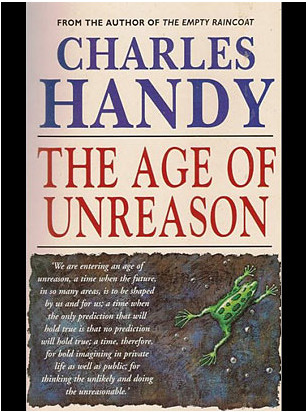Charles Handy
Work is something you do rather than something you go to.
The Greater Hunger
Africans speak of two hungers: the lesser hunger -- for the goods and services that sustain us and the means to pay for them, and the greater hunger, which has to do with understanding what life is all about.
Today, that greater hunger is even keener, for workers and executives the world over. And I worry that the only way people can satisfy it is though the lesser hunger. Money is quite accurately called compensation -- if you can't find a major purpose in life, you compensate for it by making money. What we have today is a bizarre phenomenon: Economies everywhere are growing, but once they've hit a certain level the amount of happiness or contentment in a society doesn't increase. So the lesser hunger still doesn't satisfy the greater hunger. The Purpose of Business
We need to eat to live; food is a necessary condition of life. But if we lived mainly to eat, making food a sufficient or sole purpose of life, we would become gross. The purpose of a business, in other words, is not to make a profit, full stop. It is to make a profit so that the business can do something more or better. That "something" becomes the real justification for the business.
American Capitalism
I think capitalism will win out always because people are greedy. And capitalism is the best system for making more out of less. The question is what kind of capitalism and for whose benefit is it working. And I think that you could have a less rapacious form of capitalism that would subdue all of these other conflicts. I think it's a great shame that American capitalism is ultimately what people think of because it is a pretty rapacious, pretty divisive, a very unequal country. They really do exploit people through this process. It's not a very caring kind of capitalism and that's a shame. But in the end I think the sort of capitalism that will win is a tamed capitalism.
Here we are, we're supposed to be great, prosperous and successful countries and people are unhappy, not because they're badly treated, not because they're badly managed, but because they're actually not using their lives in the way that I think is fully productive. And I call this a sort of "corporate sin." Soul
The companies that survive longest are the one's that work out what they uniquely can give to the world not just growth or money but their excellence, their respect for others, or their ability to make people happy. Some call those things a soul. Strength
“The moment will arrive when you are comfortable with who you are, and what you are– bald or old or fat or poor, successful or struggling- when you don't feel the need to apologize for anything or to deny anything. To be comfortable in your own skin is the beginning of strength.” Value of an MBA
The letters MBA should, if the schools were honest, stand for Master of Business Analysis, because the tools and disciplines of analysis are what the students learn, not management, or administration as it used to be called.
Analysis is a necessary part of good management and leadership but it is not the whole of it. Who to trust, how to inspire, how brave to be, how forgiving or not”these relationship and judgment skills may be discussed in a classroom but they can only be learned by practicing them. You can bring the world into the classroom but you cannot replicate it there. The new MBA graduate should carry a white flag as she or he goes to work for the first time ”"I know how to count," it would say. "Now teach me how to do." Living a Lie
A lot of people are sort of living a lie, they're doing things they don't really believe in because they feel they have to, and that's very uncomfortable actually… you sort of hate yourself for doing it… and it's very bad for morale, very bad for productivity. I think that one of the talents of leadership is to make that happen as little as possible.
Here we are, we're supposed to be great, prosperous and successful countries and people are unhappy, not because they're badly treated, not because they're badly managed, but because they're actually not using their lives in the way that I think is fully productive. And I call this a sort of "corporate sin." |

